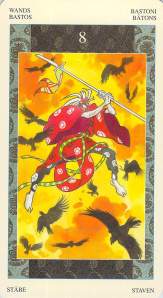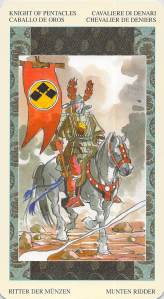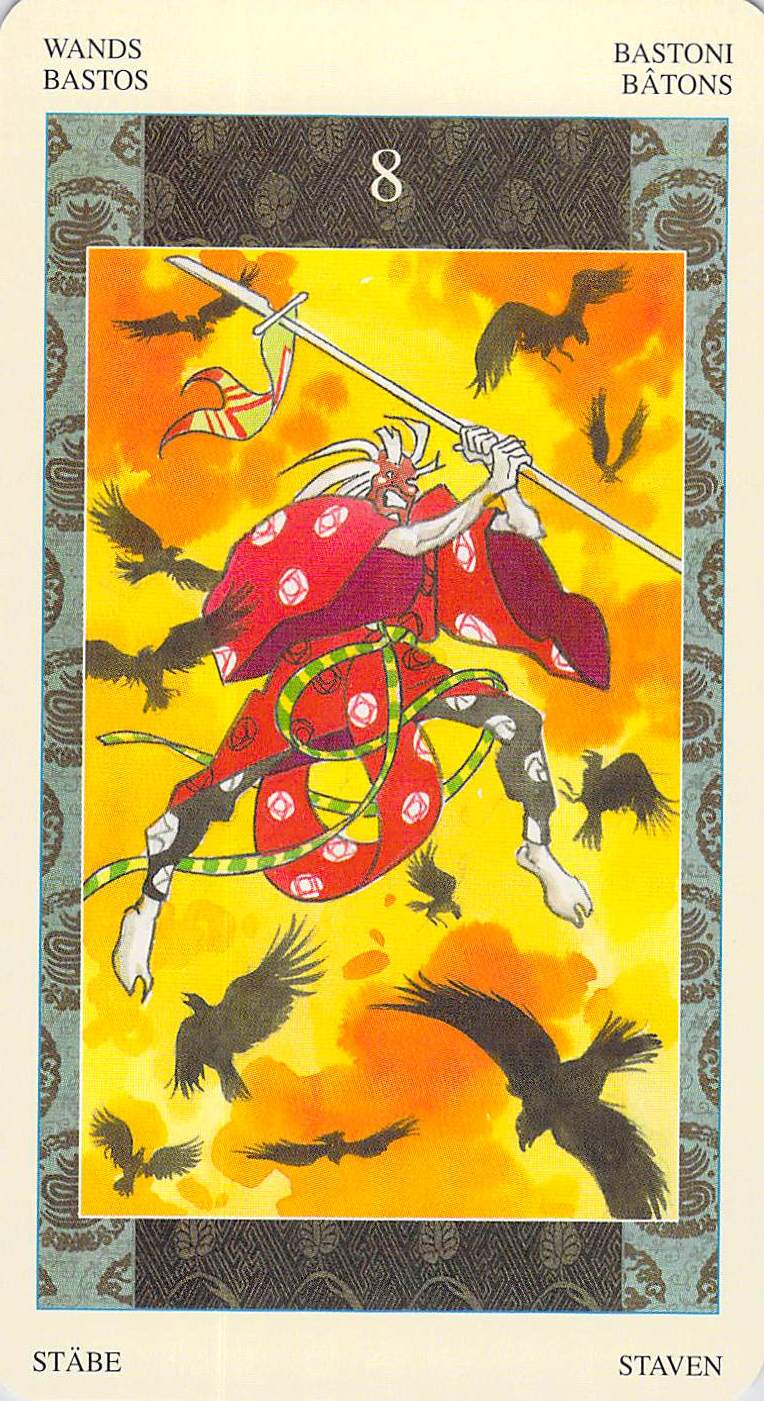We can’t help but meditate. It’s not really something that we have a choice about. Humans go into trances at the drop of a hat. Every time we concentrate on something, we meditate on it. Any type of work can be a form of meditation. Deep thought. Reflection. But the easiest meditations are the most seductive ones: books, television, daydreams. Even our most ancient ancestors stared off into the distance, or into a fire’s light. Or at the moon. The stars. The dark.
But, meditation without mindfulness is dangerous — like sleepwalking with a sharp knife in your hand, or walking blindfolded next to the edge of a cliff. Because unless we are mindful, we can let the days and hours of our lives slip away, so easily, in endless trances and dreams. Trances and dreams that we do not always, even, make for ourselves. It’s like wandering into a fairy circle and waking up to discover that many years have passed.
Wanting to write about meditation today, I drew two cards from the Samurai Tarot for guidance: the Eight of Wands, and the reversed Knight of Pentacles.
 The Eight of Wands, in the Samurai Tarot, shows a yamabushi, or mountain priest, tengu spirit, surrounded by bird tengu spirits. I didn’t know what tengu spirits were (after all this time I am still learning this deck), so I looked them up. The name tengu (or, in Chinese, tiengou) means “heavenly dogs,” and the name is thought by some scholars to be based on observations of comets that had tails similar to fox tails. The oldest stories of the tengu describe them as extremely dangerous, prone to tricking people, at least, and kidnapping them, at worst. But the stories of the tengu have changed over the centuries — in later stories, some tengu are protective mountain spirits, or the more advanced tengu, the yamabushi, supervise the less advanced tengu, the bird tengu.
The Eight of Wands, in the Samurai Tarot, shows a yamabushi, or mountain priest, tengu spirit, surrounded by bird tengu spirits. I didn’t know what tengu spirits were (after all this time I am still learning this deck), so I looked them up. The name tengu (or, in Chinese, tiengou) means “heavenly dogs,” and the name is thought by some scholars to be based on observations of comets that had tails similar to fox tails. The oldest stories of the tengu describe them as extremely dangerous, prone to tricking people, at least, and kidnapping them, at worst. But the stories of the tengu have changed over the centuries — in later stories, some tengu are protective mountain spirits, or the more advanced tengu, the yamabushi, supervise the less advanced tengu, the bird tengu.
In some tengu stories, the tengu are Buddhist angry ghosts — ghosts of people who were very arrogant in a past life. Sometimes the tengu are described as harbingers of war. It’s said that they can practice telepathy, and teleportation, that they are shape shifters, and that they have the ability to appear in our dreams.
How can the tengu be both good and bad? In The Seven Scrolls Tengu, which I haven’t read but found quoted in The Japan Times (see the link), Haruko Wakabayashi argues that “Tengu are indeed buddhas as they are, regardless of their evil nature.”
Why am I connecting tengu spirits to meditation? Because meditating without mindfulness is like being kidnapped by a mischievous or evil tengu spirit. We allow ourselves to be kidnapped in this way all the time — allow our spirits to be taken over by ghosts who aren’t even present with us. By authors of books, by the many creative spirits behind television shows and movies. By artists, by musicians. And often, as well, by our own obsessive-compulsive thought patterns. We don’t even stop to think about whether we trust the creative spirit in question before we enter into his or her world, do we? And then the world of that creative vision begins to populate our own mental environment: the world we create for ourselves out of dream fabric even if we are fully awake (or so we think).
This is extremely dangerous because our minds create the only world that we live in. Our thoughts control our entire experience of life. To allow our spirits to wander endlessly in dreamland is very self-destructive.
What’s so dangerous about a little time out for relaxation? Well, it’s just time out of your life, that’s all. While our spirits are wandering in dreamworld, our bodies are aging, and our time in this life is limited.
In addition, our dreamworld affects what we consider our “waking world.” If we allow our spirits to be hijacked by violent television shows, we are likely to create a mental world for ourselves in which we constantly fear violence. And, as many wise people keep pointing out, if we allow our spirits to be hijacked by obsessive negative thoughts about the person who pissed us off or mistreated us, then we have given up control of far too much of our lives to that person.
Like the tengu, our meditations can be good or bad. And so can the creative spirits or repetitive thoughts we follow into dreamworld as thoughtlessly as children chasing butterflies.
 What does the reversed Knight of Pentacles (though WordPress doesn’t want to let me reverse him today) add to our discussion? In the Samurai Tarot, the Knight of Pentacles is Minimoto Toritomo, the first Shogun, and he is said to represent strategy and goal-setting — “discipline in spite of adversity,” the Samurai Tarot book says. Reversed, we’ve stopped trying to be the generals of our own forces and have left the tengu in charge (for good or for bad). We have to turn Toritomo right side up again if we want to be the Shoguns in our own lives. And that means seizing control of our own minds — by meditating mindfully, not mindlessly.
What does the reversed Knight of Pentacles (though WordPress doesn’t want to let me reverse him today) add to our discussion? In the Samurai Tarot, the Knight of Pentacles is Minimoto Toritomo, the first Shogun, and he is said to represent strategy and goal-setting — “discipline in spite of adversity,” the Samurai Tarot book says. Reversed, we’ve stopped trying to be the generals of our own forces and have left the tengu in charge (for good or for bad). We have to turn Toritomo right side up again if we want to be the Shoguns in our own lives. And that means seizing control of our own minds — by meditating mindfully, not mindlessly.
What do I mean by mindfully? Well, that could be the subject of another whole blog post (and perhaps should be), but in a nutshell: I mean calling our spirits back into our bodies. I don’t just mean focusing on the breath (though that is what some people mean by mindfulness meditation). I mean focusing on the breath and also on much more: I mean grounding, being present, noticing where and when you are. Not being somewhere else.


I am regularly taken over by the evil tengu of Facebook, so I totally hear what you are saying about sleepwalking for long periods of time. I am resolved to stop. Discipline is surely what is required of me. Thank you for this. Most timeous.
LikeLike
Thank you! Yes, I get drawn into Facebook too. I am far from disciplined! Trying to work on this as well.
LikeLike
I call people who do things mindlessly sleepers. 🙂 There are lots of sleepers in the world.
LikeLike
I think we all are sometimes… 🙂
LikeLike